lantern
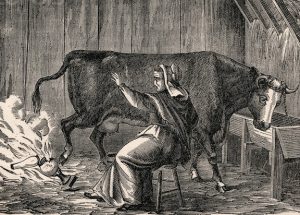
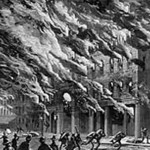 On October 8, 1871, one of the worst fires in history started in Chicago. Rumor has it that a cow kicked over a lantern in a barn, and the ensuing fire killed more than 250 people, left 100,000 homeless, destroyed more than 17,400 structures and burned more than 2,000 acres. According to the legend, the fire broke out after the cow, belonging to Mrs. Catherine O’Leary, kicked over a lamp, setting first the barn, located on the property of Patrick and Catherine O’Leary at 137 Dekoven Street on the city’s southwest side, then the whole city on fire. You’ve probably heard some version of this story yourself. People have been blaming the Great Chicago Fire on the cow and Mrs. O’Leary, for more than 130 years. Mrs. O’Leary denied this charge. Recent research by Chicago historian Robert Cromie has helped to debunk this version of events.
On October 8, 1871, one of the worst fires in history started in Chicago. Rumor has it that a cow kicked over a lantern in a barn, and the ensuing fire killed more than 250 people, left 100,000 homeless, destroyed more than 17,400 structures and burned more than 2,000 acres. According to the legend, the fire broke out after the cow, belonging to Mrs. Catherine O’Leary, kicked over a lamp, setting first the barn, located on the property of Patrick and Catherine O’Leary at 137 Dekoven Street on the city’s southwest side, then the whole city on fire. You’ve probably heard some version of this story yourself. People have been blaming the Great Chicago Fire on the cow and Mrs. O’Leary, for more than 130 years. Mrs. O’Leary denied this charge. Recent research by Chicago historian Robert Cromie has helped to debunk this version of events.
From that event, came a proclamation by President Calvin Coolidge that the first National Fire Prevention Week be held on October 4-10, 1925. The move started a tradition recognizing October as Fire Prevention Month, the first week in October becoming Fire Prevention Week, and the second Saturday becoming Home Fire Drill Day. Fire Prevention Week is observed on the Sunday through Saturday period in which October 9 falls, in commemoration of the Great Chicago Fire, which began October 8, 1871, and did most of its damage October 9. The month and week are filled with information designed to teach people how to prevent fire disasters, as well as activities for children designed to teach them too.
None of us wants to have to really get out of a home fire situation, but it is really important that people know how in the unfortunate event that their home does catch on fire. So, the last part of Fire Prevention Month is Home Fire Drill Day, which is today, October 14, 2017. It is a day to plane your escape routes, and practice 
 getting out, especially with children. It is designed also, to point out where you might be vulnerable and what equipment might be needed to make your home safe, such as smoke alarms, fire extinguishers, and escape ladders. Whether you have little ones or not, it is so easy to get confused or disoriented in a fire emergency. Just like in the schools, routine practice makes every step of a fire evacuation a habit, and it could very likely save your life or that of your family. Why not start today?
getting out, especially with children. It is designed also, to point out where you might be vulnerable and what equipment might be needed to make your home safe, such as smoke alarms, fire extinguishers, and escape ladders. Whether you have little ones or not, it is so easy to get confused or disoriented in a fire emergency. Just like in the schools, routine practice makes every step of a fire evacuation a habit, and it could very likely save your life or that of your family. Why not start today?
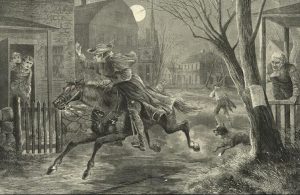 When the United States was first trying to become a sovereign nation, due to the unfair treatment it received from its parent nation, Great Britain, King George III’s army tried to stop it in any way they could. I’m sure the king could see the possibilities this nation had, and I’m also sure he could see the writing on the wall concerning our independence. Still, the king said to fight, so fight they did. The people in the colonies thought the king’s rule was tyrannical and infringed on the colonists’ “rights as Englishmen”, and so they declared the colonies were going to be free and independent states. A war ensued, that we know as the Revolutionary War.
When the United States was first trying to become a sovereign nation, due to the unfair treatment it received from its parent nation, Great Britain, King George III’s army tried to stop it in any way they could. I’m sure the king could see the possibilities this nation had, and I’m also sure he could see the writing on the wall concerning our independence. Still, the king said to fight, so fight they did. The people in the colonies thought the king’s rule was tyrannical and infringed on the colonists’ “rights as Englishmen”, and so they declared the colonies were going to be free and independent states. A war ensued, that we know as the Revolutionary War.
On April 7, 1775, British activity suggested the possibility of troop movements, and Dr Joseph Warren, an American physician who played a leading role in American Patriot organizations in Boston in the early days of the American Revolution, sent Paul Revere to warn the Massachusetts Provincial Congress, which was located in Concorde. This was also the site of one of the larger caches of Patriot military supplies. The warning spurred the residents into action…moving the military supplies away from the town. Just one week later, on April 14, General Gage received instructions from Secretary of State William Legge, Earl of Dartmouth. The orders had been dispatched on January 27. The British soldiers were told to disarm the rebels. It was known that they often hid weapons in Concord, as well as other locations. They were told to imprison the rebellion’s leaders, especially Samuel Adams and John Hancock. Dartmouth gave Gage considerable discretion in his commands. Gage issued orders to Lieutenant Colonel Francis Smith to proceed from Boston “with utmost expedition and secrecy to Concord, where you will seize and destroy… all Military stores…. But you will take care that the soldiers do not plunder the inhabitants or hurt private property.” Gage did not issue written orders for the arrest of rebel leaders, because he was afraid that doing so might spark an uprising.
On the night of April 18, 1775, with tensions rising, Joseph Warren went to see Revere and William Dawes. He told them that the king’s troops were about to embark in boats from Boston bound for Cambridge, as well as the road to Lexington and Concord. Warren’s intelligence suggested that the most likely objectives of the 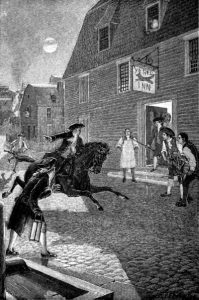 regulars’ movements later that night would be the capture of Adams and Hancock. They did not worry about the possibility of regulars marching to Concord, since the supplies at Concord were safe, but they did think their leaders in Lexington were unaware of the potential danger that night. Revere and Dawes were sent out to warn them and to alert colonial militias in nearby towns. Prior to this time, Revere had instructed Robert Newman, the sexton of the North Church, to send a signal by lantern to alert colonists in Charlestown as to the movements of the troops when the information became known. In what is well known today by the phrase “one if by land, two if by sea”, one lantern in the steeple would signal the army’s choice of the land route while two lanterns would signal the route “by water” across the Charles River. The British would ultimately take the water route, so two lanterns were placed in the steeple. Revere first gave instructions to send the signal to Charlestown. He then crossed the Charles River by rowboat, slipping past the British warship HMS Somerset at anchor. Crossings were banned at that hour, but Revere safely landed in Charlestown and rode to Lexington, avoiding a British patrol and later warning almost every house along the route. The Charlestown colonists dispatched additional riders to the north. Riding through present-day Somerville, Medford, and Arlington, Revere warned patriots along his route, many of whom set out on horseback to deliver warnings of their own. By the end of the night there were probably as many as 40 riders throughout Middlesex County carrying the news of the army’s advance. Revere did not shout the phrase “The British are coming!” The success of his mission depended on secrecy, and the countryside was filled with British army patrols, and most of the Massachusetts colonists, who were predominantly English loyalists. Revere’s warning, according to eyewitness accounts of the ride and Revere’s own descriptions, was “The Regulars are coming out.” Revere arrived in Lexington around midnight, with Dawes arriving about a ½ hour later. They met with Samuel Adams and John Hancock, spending a great deal of time discussing plans of action. They believed that the forces leaving the city were too large for the sole purpose of arresting two men and that Concord was the main target. The Lexington men dispatched riders to the surrounding towns, and Revere and Dawes continued along the road to Concord accompanied by Samuel Prescott, a doctor who happened to be in Lexington. Revere, Dawes, and Prescott were detained by a British Army patrol in Lincoln at a roadblock on the way to Concord. Prescott jumped his horse over a wall and escaped into the woods. He eventually reached Concord. Dawes also escaped, but fell off his horse not long after and did not complete the ride. After being roughly questioned for an hour or two, Revere was released when the patrol heard Minutemen alarm guns being fired on their approach to Lexington.
regulars’ movements later that night would be the capture of Adams and Hancock. They did not worry about the possibility of regulars marching to Concord, since the supplies at Concord were safe, but they did think their leaders in Lexington were unaware of the potential danger that night. Revere and Dawes were sent out to warn them and to alert colonial militias in nearby towns. Prior to this time, Revere had instructed Robert Newman, the sexton of the North Church, to send a signal by lantern to alert colonists in Charlestown as to the movements of the troops when the information became known. In what is well known today by the phrase “one if by land, two if by sea”, one lantern in the steeple would signal the army’s choice of the land route while two lanterns would signal the route “by water” across the Charles River. The British would ultimately take the water route, so two lanterns were placed in the steeple. Revere first gave instructions to send the signal to Charlestown. He then crossed the Charles River by rowboat, slipping past the British warship HMS Somerset at anchor. Crossings were banned at that hour, but Revere safely landed in Charlestown and rode to Lexington, avoiding a British patrol and later warning almost every house along the route. The Charlestown colonists dispatched additional riders to the north. Riding through present-day Somerville, Medford, and Arlington, Revere warned patriots along his route, many of whom set out on horseback to deliver warnings of their own. By the end of the night there were probably as many as 40 riders throughout Middlesex County carrying the news of the army’s advance. Revere did not shout the phrase “The British are coming!” The success of his mission depended on secrecy, and the countryside was filled with British army patrols, and most of the Massachusetts colonists, who were predominantly English loyalists. Revere’s warning, according to eyewitness accounts of the ride and Revere’s own descriptions, was “The Regulars are coming out.” Revere arrived in Lexington around midnight, with Dawes arriving about a ½ hour later. They met with Samuel Adams and John Hancock, spending a great deal of time discussing plans of action. They believed that the forces leaving the city were too large for the sole purpose of arresting two men and that Concord was the main target. The Lexington men dispatched riders to the surrounding towns, and Revere and Dawes continued along the road to Concord accompanied by Samuel Prescott, a doctor who happened to be in Lexington. Revere, Dawes, and Prescott were detained by a British Army patrol in Lincoln at a roadblock on the way to Concord. Prescott jumped his horse over a wall and escaped into the woods. He eventually reached Concord. Dawes also escaped, but fell off his horse not long after and did not complete the ride. After being roughly questioned for an hour or two, Revere was released when the patrol heard Minutemen alarm guns being fired on their approach to Lexington.
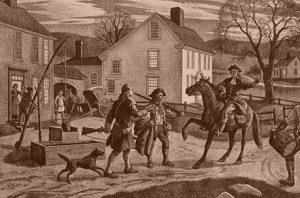
About 5am on April 19, 700 British troops under Major John Pitcairn arrived at the town to find a 77 man strong colonial militia under Captain John Parker waiting for them on Lexington’s common green. Pitcairn ordered the outnumbered Patriots to disperse, and after a moment’s hesitation, the Americans began to drift off the green. Suddenly, the “shot heard around the world” was fired from an undetermined gun, and a cloud of musket smoke soon covered the green. When the brief Battle of Lexington ended, eight Americans lay dead and 10 others were wounded Only one British soldier was injured. The American Revolution had begun.
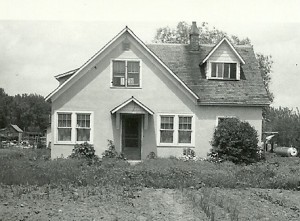 All too often, in this day and age, we don’t think about the modern conveniences that we have. Things like electricity, indoor plumbing, gas (both for cars and houses), cars, television, and telephone are the normal everyday items we count on, but think very little about.
All too often, in this day and age, we don’t think about the modern conveniences that we have. Things like electricity, indoor plumbing, gas (both for cars and houses), cars, television, and telephone are the normal everyday items we count on, but think very little about.
When you consider that not so very many years ago, people had to either get out of bed, practically get dressed, and go outside…even in the bitter cold of winter, to go to the outhouse, you know the outdoor toilet which was a little building out back of the house, or have a pot in the bedroom to use, and then emptied in the morning. Neither choice was perfect, but I suppose the pot in the house would have been better than going outside in the bitter cold of winter. These days we abhor the thought of stopping at a rest stop on a trip and finding out that all it has is an outhouse, because we expect that every place has modern indoor plumbing, whether it is a fact or not.
In times past, people went to bed and got up with the sun, because it was too expensive to light candles or lanterns. The work had to be done by daylight anyway, so they might just as well be up at dawn. of course, most teenagers these days consider anything before noon to be pure torture, and might even whine a little if they have to be up before that hour. Still, there wasn’t really any shift work back then, and families were together in the evening, unless the father was working in another state or town.
Letters were used to communicate, and unfortunately that often meant that if your loved ones didn’t live in the same place you did, you might hear of their passing months after the fact. It took a long time for letters to arrive, especially if they were coming from back east. Today, we can inform people of events that happen in our lives, almost the second they happen. In fact, it’s almost like they are there with you, and if it is an event you know about ahead of time, you can Skype with them, and they can watch it happen. Sometimes, even with all of our modern conveniences, we still think life is really hard, but if we think back to days gone by, we will know that we really have no idea what a hard life is.

